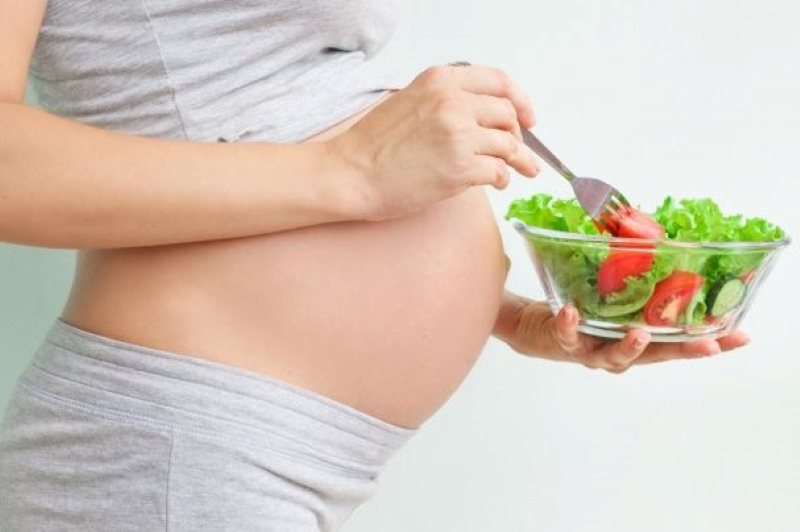
Nutrition during pregnancy: what to eat and what to avoid
Proper nutrition during pregnancy is essential as the mother’s nutritional status affects the baby’s health
It is therefore important to balance caloric intake and limit weight gain to prevent neonatal pathologies and gestational diabetes.
Nutrition and pregnancy, how many meals to eat during the day?
During the day it is recommended to divide the food between three meals (breakfast, lunch, dinner) and two snacks.
Snacks are mandatory, otherwise you will arrive hungrier at the main meal and store more calories.
Pregnancy and nutrition, which are the foods to avoid
Sweets and the risk of gestational diabetes
Do not eat sweets, ever, on any occasion: sweets, packaged snacks, candies, etc., give calories with little nutritional value.
The glycemic swings that are created pass through the placenta and create problems for the fetus, primarily through the predisposition of the mother to gestational diabetes, but even independently of this they can alter fetal growth, the amount of amniotic fluid, and favor the development of type 2 diabetes in the fetus when it is an adult.
Do not take hazelnut-based creams, because they are actually made with vegetable oil (as stated by the ingredients list).
Rather, it is preferable to eat two squares of good chocolate, perhaps artisanal, with a slice of bread at the end of a meal or as a snack.
Beware of hidden sugars: it is a good habit to read food labels.
Would you have ever thought that there is sugar even in salty foods, such as salami and ready-made sauces?
Raw foods and toxoplasmosis
In the event of a negative test for toxoplasmosis, it is forbidden to eat raw foods, as well as do gardening work and clean the cat litter box.
It doesn’t matter to drive the family cat away, it’s absolutely useless and only creates disappointment.
What and how much to drink during pregnancy
It is important to drink a lot, at least 2 liters of water a day is recommended.
Drinking in abundance favors intestinal regularity, increases diuresis, thus reducing the risk of urinary and vaginal infections, which can jeopardize the regular course of pregnancy.
The indicator if you really drink enough is the urine test parameter which expresses the specific weight, i.e. the density: the lower this value is, the better we are drinking.
In the first trimester, when there are nauseas, it is better to drink in small sips during the day.
Carbonated drinks and fruit juices are not recommended: in addition to the caloric impact, they are drinks containing various chemicals used as preservatives.
Furthermore, the stomach acid that often accompanies pregnancy worsens with this type of drink.
Natural mineral water, with a slight degree of effervescence, may be welcome, especially in the first trimester when there are nauseas.
Beverages containing caffeine can be drunk in moderation.
Be careful, however, to stop taking too many coffees because a rebound headache could occur, therefore it is advisable to gradually reduce the intake of these drinks.
As for herbal teas, most herbal preparations are not recommended during pregnancy, so it is better to talk to your doctor before taking drinks and herbal remedies.
Regarding alcohol, the intake of small quantities, for example on special occasions or two fingers of wine with meals, is not contraindicated.
At high doses, alcohol is responsible for malformations and mental retardation in the newborn.
Nutrition, weight gain in pregnancy
Body weight should be kept under control: the amount of kg allowed for gaining weight during pregnancy (10-12) varies according to the starting weight, as expressed by the BMI (weight/height squared).
If you start out overweight, the kilos allowed are less and you have to go on a diet from the first few weeks.
It is important to check your weight at every visit to the gynecologist.
If there are particular situations, such as polycystic ovary syndrome with insulin resistance, it is better to consult a nutritionist or dietitian expert in the sector to make a personalized food program.
Pregnancy is a beautiful journey, try not to take unnecessary risks!
Read Also
Emergency Live Even More…Live: Download The New Free App Of Your Newspaper For IOS And Android
What Drugs Should Be Avoided During Pregnancy?
Ramadan Fasting For Pregnancy And Breastfeeding Mother
Postpartum Depression: What It Is, Symptoms, Diagnosis And Treatment
Constipation In Pregnancy, What To Do?
Congenital Heart Disease And Safe Pregnancy: The Importance Of Being Followed From Before Conception
Pathologies In Pregnancy: An Overview
Integrated Pregnancy Test: What Is It For, When Is It Done, Who Is It Recommended For?
Trauma and Considerations Unique to Pregnancy
Guidelines for the Management of a Pregnant Trauma Patient
How To Provide Correct Emergency Medical Care To A Pregnant Woman With Trauma?
Pregnancy: A Blood Test Could Predict Early Preeclampsia Warning Signs, Study Says
Trauma During Pregnancy: How To Rescue A Pregnant Woman
Travelling During Pregnancy: Tips And Warnings For A Safe Holiday
Diabetes And Pregnancy: What You Need To Know
Emergency-Urgency Interventions: Management Of Labor Complications
Seizures In The Neonate: An Emergency That Needs To Be Addressed
Postpartum Depression: How To Recognise The First Symptoms And Overcome It
Postpartum Psychosis: Knowing It To Know How To Deal With It
Childbirth And Emergency: Postpartum Complications
Childhood Epilepsy: How To Deal With Your Child?
Thyroid And Pregnancy: An Overview
Folic Acid: What Is Folin Used For?
What Is Folic Acid And Why Is It So Important In Pregnancy?
Dermatosis And Itching In Pregnancy: When Is It Normal And When To Worry?
Pregnancy: What It Is And When Structural Ultrasound Is Necessary
Preeclampsia And Eclampsia In Pregnancy: What Are They?


